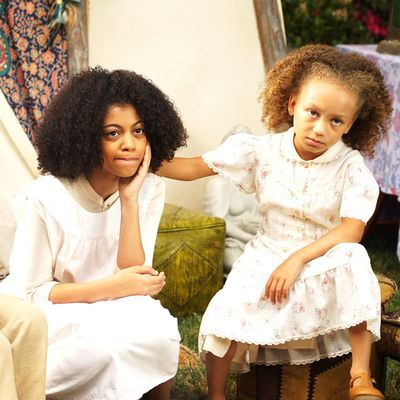
Early on in tonight’s premiere of the Black-ish spinoff Mixed-ish, written by Kenya Barris and Peter Saji, we’re presented with an image of the Johnson family beatifically asleep in their commune, which will soon be raided. It’s an almost utopian image of a blended family, a notion that is solidified when the adult Rainbow Johnson (Tracee Ellis Ross) notes via voice-over that within the bubble of the commune there was “no racism, no sexism, and everyone was truly equal.”
This sort of sentiment around interracial partnerships isn’t new. As Lauren Michele Jackson wrote for BuzzFeed two years ago, there’s a “culture-wide infatuation with interracial relationships and their heteronormative outcome, multiracial children. In advertising, on film, and on TV, there is a common preference for multiracial-looking people, along with the belief that they represent a utopian political future. Why do multiracial children so often function as the antonym for racism? What is the political value of an interracial relationship? The notion that cream-colored babies will save the world is a popular one. Unfortunately, it’s a myth.”
Going into Mixed-ish, I wondered what edification the show could offer about these questions of multiracial identity and family. Could a sitcom of this sort truly deal with the thorny politics of being half-white and half-black in America during the 1980s and still speak eloquently to today? I was granted only one episode for review, but as it stands, Mixed-ish has work to do before it achieves the right balance. While the show is mostly well cast, with the expressive Arica Himmel making a great 12-year-old Rainbow Johnson, the humor in the premiere episode vacillates between being too saccharine and too bluntly reliant on well-worn racial stereotypes.
Mixed-ish begins with the clumsy framing device of the adult Rainbow reflecting back on her childhood after being reminded that she grew up in what was essentially a cult. Ross’s voice-over is gentle and illuminating, placing us in the mind-set of her younger self, who is fiercely trying to hold on to her old way of life and, by extension, the naïveté that allowed her to avoid considering race as a factor in her life. Ross’s voice-over reminds us that Loving v. Virginia had just made interracial marriage legal in 1967 and that pairings like these are far more common now than they were in 1985.
It’s a fair point worth making, but the show’s depiction of the Johnson siblings — who also include the sassy, wise beyond her years youngest, Santamonica (Mykal-Michelle Harris); and the middle child, Johan (Ethan William Childress) — being ostracized at school left a sour taste in my mouth. Walking into the lunchroom, the siblings are confronted by a black kid who asks, “What are you weirdos mixed with?,” prompting Rainbow to wonder in confusion, “What’s mixed?” The Johnson siblings may have lighter complexions, but it’s hard to imagine their mere presence leaving another black person confused even in the 1980s. Even stranger is how the narrative sets up the idea that the Johnson siblings must choose between being black or white, as if the racial codes of America would ever make such passing possible for them. In this moment, the prickly racial dynamics of the fledgling series feel both blunt and thinly construed — which is perhaps understandable at this early stage but would have been easier to endure if the show’s humor fared better.
In both concept and casting, Mixed-ish possesses the right pieces, but it hasn’t yet figured out how to fit them together in a satisfying way. Tika Sumpter is radiant as Rainbow’s mother, Alicia, but it’s hard to buy into the character given how quickly she goes from wanting her children and family to be “above race” to realizing how impossible that is. Sumpter and Mark-Paul Gosselaar, as the family’s idealistic patriarch, Paul, share flashes of easygoing charm, but the chemistry between them hasn’t gelled. Worse yet is Gary Cole, an actor I typically like but who is saddled here with playing a blunt caricature of a Republican who says lines like “This is why I don’t do cocaine. I am cocaine.” That the character has any impact at all is thanks to Cole’s skills as a comedic performer. But like so much about the premiere — from its too-clean set design to its too-clean outlook on race — it only half works, at best.


